- Home
- Marcia Evanick
A Misty Harbor Wedding Page 6
A Misty Harbor Wedding Read online
Page 6
“Of course.” He cupped her elbow as she maneuvered her way over the next set of rocks. “As soon as she can handle all that potty stuff on her own.”
“Chicken,” Sierra teased.
“Uncle Matt, Uncle Matt!” shouted Tyler. He was holding something big in his hands and jumping up and down. “I found it, I found it!”
“Found what?” It looked like a piece of lumber to him, not a tree branch. The wood looked to be six inches by about twelve inches.
Tyler was showing Austin his treasure by the time Sierra and Matt joined them. “What did you find, Tyler?” Sierra asked.
“Part of a pirate ship.” Tyler proudly held out the board to him. “See, that’s the ship’s name.”
Matt carefully took the board and held it so Sierra could see too. It was a piece of weathered board that at one time must have been part of a wine crate. Now it was dried and bleached by the sun. In fancy faded green print were the words Château Ausone. “Looks French to me.”
He knew only two things about wine. It came in white and red. He was a beer man. Something told him that whatever Château Ausone was, it had to be expensive.
Sierra leaned in close and whispered in Matt’s ear, “It’s a Saint-Emilion wine.”
“French?” Tyler frowned at the board. “Can pirates be French?”
“Sure can.” Matt handed the board back to his nephew. He wondered how Sierra knew the wine. “From some of the stories I heard about French pirates, they were the worst kind.”
Sierra rolled her eyes.
Chapter Four
Gordon Hanley heard the bell above the door to his shop announce a customer. He turned to the doorway opening into the shop and yelled, “I’ll be right there.”
A unfamiliar woman’s voice politely called back, “Thank you.”
He chuckled as he pulled a stack of books out of one of the cartons that had arrived this morning. Most of the book shipments arrived on Tuesdays. Today was no exception. Today was also the day a customer was thanking him for keeping them waiting. Amazing. What would be next? He could win the odds on Olivia Wycliffe delivering a healthy baby boy by midnight. So far, the odds were fifteen-to-one against him. If Olivia had the baby today, he would win enough to purchase himself another early birthday present. This time he was thinking about a Larsen pipe.
Sheriff Larson frowned on the bookie operation he ran from the back room, but someone needed to keep the odds, collect the losses, and handle the payouts. His book and tobacco store was centrally located in town, and people trusted him. What could he say—he was good at numbers.
The birth of Ethan and Olivia’s baby was the only bet he had going at the time. Last week Daniel Creighton won the pot by guessing not only the day but also the sex of Erik and Doc Sydney Olsen’s first child. The Olsens had welcomed a tiny baby girl, named Inga. Gordon’s money had been on a big husky boy, like his father, making an early arrival.
Live and learn. Predicting babies was a lot harder than figuring out who was falling in love or who would be catching the biggest tuna of the year. Babies were an unpredictable lot. Erik had known his wife’s due date, and even he had been off by two weeks. The big Norwegian was so in love with his little daughter, he had happily handed over his losses while passing out cigars.
Erik had purchased Gordon’s most expensive box of cigars for the special occasion.
With a towering stack of the newest hardbacks balanced in his hands, Gordon left the tiny stockroom and headed for the front of the shop. A customer awaited.
Gordon put the books on the counter and eyed the woman standing in front of a bookshelf. From the back it was hard to tell her age, but he would guess between twenty and forty. Long, nearly black hair was past her waist. He had to wonder if she could sit on it. A long, flowing brown skirt with light blue swirls came to her ankles, and chunky sandals were on her feet. The light blue sleeveless top and the swirls on the skirt saved the woman from blending into the walls. He preferred his shop, the Pen and Ink, dark and dreary. His eyes were extremely sensitive to the light, adding to the mystery.
After all, he had a reputation to maintain and protect. What kind of vampire would he be if he allowed sunlight to flood his shop?
He watched as the tall, thin woman reached for a book. Her hands were much younger than forty, but she didn’t wear all the jewelry young people wore. A plain brown leather–banded watch was on her right wrist. What he found most interesting was the book she had selected, a relatively old hardcover that had been sitting on the shelf for years: Shakespeare’s Sonnets.
If he had been thirty years younger, he would be halfway in love. Any woman who appreciated William Shakespeare had his undying devotion and attention. The day was indeed looking up. With the way his luck was running today, this customer might be able to hold up her end of a conversation on dear old Will.
“ ‘A hundred thousand welcomes. I could weep and I could laugh, I am light and heavy. Welcome.’” He quoted the Bard, as a way of a greeting. It was his way of testing her knowledge on the subject he held dear to his heart.
“Coriolanus. I’m impressed.” The young woman turned around.
Gordon felt his heart slam against his chest and his breath leave his lungs. He wondered if this was going to be the last face he’d see on this earth. If it was, he’d go gladly. Before him stood his daughter. “Juliet,” he whispered in astonishment.
The young woman froze.
This was the daughter he had never met. Hell, he hadn’t even known she existed until eleven years ago, when out of the blue a letter arrived from Victoria Knox, a woman he had met when teaching English literature at a small college in Rhode Island. A woman he had fallen in love with. Victoria had explained how his daughter thought someone else was her father. Victoria had begged his forgiveness, and his silence. For months he had stared at the photo of his fifteen-year-old daughter, Juliet, that Victoria had enclosed with her letter. He could never bring himself to destroy her safe and secure world, so he held his silence.
He paid his penance.
The five-by-seven color photo had been placed in an antique sterling silver frame and was still sitting on his nightstand upstairs.
“You recognize me?” Juliet seemed uncertain, awkward, and shy.
Juliet really hadn’t changed much in the past eleven years, but she had grown more beautiful. His daughter had grown from an awkward fifteen-year-old into a beautiful young woman. Gone were the braces. Gone were the glasses and the high-buttoned blouse that had seemed so out of date on the young, serious-looking girl. He would have recognized her on any street in the world. This was his daughter. There was no mistaking the Hanley in her. She didn’t resemble Victoria at all. The poor kid looked like her dad.
“I would have known you anywhere.” He was uncertain what to do. He wanted to pull her into his arms and never let go. In the twenty-six years since she had been born, he had missed everything.
“Mom said that she had sent you a picture.” Juliet clutched the book in front of her like a shield.
There was no mistaking the sheen of tears in her eyes. “Is Victoria all right?” He knew there was an edge of panic in his voice, but he couldn’t help it. Something must have happened to Victoria. Why else would Juliet be standing in his shop after all these years?
Juliet must have sensed his panic and quickly said, “Mom’s fine.” His daughter glanced around the shop. “She knows I’m here.” Nervous fingers toyed with the book held in their grasp.
“Is she all right with that?” Juliet looked like she was ready to bolt out of the shop at any second. “How is your mom doing?” Ordinary questions that seem so inane, but he didn’t know where else to begin. The hard questions would scare her off. He wanted to put his daughter at ease. He definitely did not want to ruin this moment.
“Mom’s fine.”
“And your . . . father? How is he?” What else was he supposed to call the man who had raised Juliet as his own? In the letter eleven years ago, Victoria h
ad told him that Juliet thought Ken Carlyle was her real father. Obviously the truth had finally gotten out. One had to wonder why, after all these years.
Juliet hesitated for a moment. “Dad passed away two years ago.”
“I’m sorry to hear that.” And he was. Victoria had written that Ken Carlyle was a caring, devoted, and loving father.
“Thanks.” Juliet looked around the shop. “So this is the Pen and Ink?”
His daughter looked about as uncomfortable as he felt. “Would you like a tour?” He gave a sigh of relief when she slowly nodded. “As you can see, you’re standing in the book section.” His hand waved to the counter behind him. “That’s the cash register.” A turnstile filled with postcards was beside the counter. The wall between the double front entry doors and the counter was crammed with magazines, newspapers, and the typical tourist information brochures.
He took a couple of steps to his left. “This is the rest of the books, a small stationery section, and of course pens. Can’t have the Pen and Ink without the pens.”
Juliet walked over to the display of pens and seemed impressed. He didn’t stock normal, everyday pens that one could purchase across the street at Krup’s General Store. He carried only a few top-of-the-line luxury pens. Most were fountain pens, some ballpoint, and a few rollerball. All of them were neatly displayed in two locked glass cases and had price tags that gave the local residents sticker shock. The pens weren’t for the locals. They were for the tourists.
Rich tourists.
People who were willing to shell out more than a hundred dollars for an onyx and sterling Aurora, or a Cartier, or a Cross. Some had platinum, some gold. They were expensive finger jewelry for the businessman or woman.
“Do you sell many of these?” Juliet gazed at the pens like most women looked at diamonds.
“A dozen or so during the tourist season.” He moved to the room at the back of his store. “This is what the shop was before I purchased it.”
Juliet looked into the room and wrinkled her nose. “A tobacco shop.”
“How did you ever guess?” he chuckled. A wall humidor case that was stocked with tobacco and cigars took up the entire far wall. Other display cases held humidors that were made out of everything from crystal to silver plate to Spanish cedar. A few of the humidors were new, but most were prized antiques. Pipes lined another case. In the center of the room was a small mahogany table with a chess board, set up and ready to play. Two comfortable leather chairs that were way past their prime flanked the table. Ashtrays and pipe holders were everywhere. Most were for sale, but a few were used by customers, chess players, and himself. An old, and at one time very expensive, rug was faded, worn, and had quite a few burn marks.
He frowned at the rug and counted his lucky stars that the rug and entire shop hadn’t gone up in flames. He would have lost not only his shop but also a place to rest his weary head. The entire second floor of the shop was his apartment, his home.
“Don’t you think that books and tobacco make a strange combination?” Juliet walked around the room, but she didn’t linger like she had over the books and pens.
“I know, the smoke.” He nodded toward the counter, where his pipe of the day was lying unlit. “I smoke a pipe, so I don’t notice it as much as other people.”
“What do the customers think of the books smelling like a pipe?”
“Most don’t mind it, and the few that do, we work out other arrangements.” He had never had to justify his pipe smoking to anyone before. “I was going to turn the whole shop into a bookstore, but a lot of the locals asked me to continue to stock their tobacco and smoking items. At the time I figured ‘why not,’ since the display cabinets and inventory came with the price of the shop.” He chuckled at the memory. “Next thing I knew, I was smoking a pipe, selling books, and playing chess with the locals during the slow days.”
“Is that how you spend your days?”
“Most of them.” He looked at the clock above the register. It was a little after one. “Have you had lunch yet? Are you hungry?”
“I had a sandwich and a soda at the general store right before I came in here.” Juliet gave him a small smile. “I was trying to work up the nerve to walk in here and meet you.”
“I’m glad you did.”
“I wasn’t sure what to expect, so I kept walking up and down the sidewalk all morning. I must have passed the shop a dozen times, but I couldn’t see in the windows, so I wasn’t even sure you were here.” A flush stained her cheeks. “I think people were starting to notice me.”
“They would have to be blind not to notice you, Juliet.” He marveled once again at the woman standing before him. “You’re a beautiful woman.”
Juliet’s flush turned darker. “Thank you. My unannounced appearance isn’t going to cause any problems, is it? I’ll leave if there are.”
“Problems? What problems?” As far as he knew, the only thing wrong with this meeting was it was happening twenty-six years late.
“Mom wasn’t sure if you had married, or if you had children. My being here could cause all types of problems.”
“I have one child, Juliet, and that’s you.” He understood her concern, but it was groundless. “I never married, but if I had, you always would have been welcome.” He had no idea what Victoria had told her, but he wanted Juliet to know he would have wanted her, if he had known.
Juliet slowly smiled. “Thank you.”
“You have nothing to thank me for.” This had to be the most awkward conversation he’d ever held in his life. “How about I go upstairs to get us something to drink, and we can relax a bit? Maybe sit in there.” He waved toward the smoking room. It was the only place in the shop to sit, besides a stool he kept behind the cash register.
“That sounds good.” Juliet’s shoulders seemed to relax a bit.
He was halfway to the stairs that led up to his apartment when a thought occurred to him. “I have no idea what you like to drink. I only have diet soda, orange juice, and milk. I could make a pot of coffee or tea, if you would prefer.”
“Diet soda is fine.”
He hurried up the stairs and rushed around his kitchen gathering anything he thought she might like. His fingers were shaking so badly that he dropped two ice cubes onto the floor. After a couple of deep breaths he convinced himself Juliet would still be there when he went back down. She had driven all the way up from Boston to see him. She wasn’t going to disappear.
Searching the cabinet, he found a box of cookies with a couple left and a new box of fancy crackers. He added those to the tray and hoped she wasn’t allergic to anything. His father had had a reaction to strawberries, and he had to wonder if it could have been passed to his daughter.
He frowned down at the tray, wishing he had something more impressive than sick-looking blue glasses that he had bought more than twenty years ago, and mismatched plates. At least the tray was an elegant silver-plated antique he had picked up in London two years ago. Or it would have been if he had bothered to polish it once in a while. There wasn’t anything he could do about the tray, or the dishes. He carefully carried the tray down the stairs that ended in the tobacco room.
Juliet was struggling to open the windows. One was open, and she was mumbling under her breath as she tried to raise the other one. The windows were very seldom opened. The reason for that was obvious. They were a bitch to get up or down.
“Here, I’ll get that.” He placed the tray on the table next to the chess set and put his weight behind trying to open the wooden-framed window. Either the frame was swollen by too many winters and summer storms, or it had been painted one too many times. It took him a few minutes, but he finally managed to get the window up. A cool summer breeze blew sea-scented air into the room.
Juliet pulled her hair to one side, then sat down in the chair closest to the window. “Thank you. I hope you don’t mind me opening them.”
“Not at all.” He moved the chess set to the top of a display case. “Sorry,
I guess the aroma can be a little overbearing.”
Juliet wondered if her eyes were watering. The stench of burnt tobacco and cigars permeated everything in the entire shop. How did Gordon Hanley, the man who was her biological father, stay in business? “You don’t have to apologize. I’m just not used to smokers, that’s all.”
“It’s a nasty habit.”
She smiled. “Yet you do it.” Her mother told her Gordon Hanley had been a dramatically romantic figure, that every college girl had dreamt about. She tried to picture what Gordon had looked like twenty-six years ago. Sitting across from him, she could see what her mother had meant. Gordon was still a good-looking man, in a Gothic sort of way. He must have been stunning back in his youth. He was tall and thin with an angular face and flowing long black hair that was now streaked with gray. The man who had fathered her looked like a poet.
“I’ve never touched a cigarette or a cigar. Now a pipe is a different story.” Gordon picked up a glass of soda and relaxed into the chair. “A man needs a vice or two to stay sane in this world.”
“I could think of worse vices.” She now understood where she got her height, her dark hair, and her metabolism. Her mother and sister, Miranda, constantly groused about how she could eat anything and not gain an ounce, while they just looked at food and their jeans got tighter.
“Like having a child and never giving one dime of support?”
She worried her lower lip at the serious change of topic. A touchy subject, by the tone of Gordon’s voice. “From what I’ve been told, you didn’t know my mother was pregnant or about me till I was fifteen. My mother asked you not to interfere or contact us.”
Gordon didn’t deny that statement. “When did Victoria tell you about me?”
“Two months ago. We were having a family dinner when the topic of who had what blood type came up. Mom changed the subject and then asked me to stay after my brothers and sister left.”
“Brothers and a sister?”
“You don’t know?” She stared at Gordon Hanley, her father, and realized he knew about as much about her life as she knew of his. Absolutely nothing. “I have two brothers and a sister.”

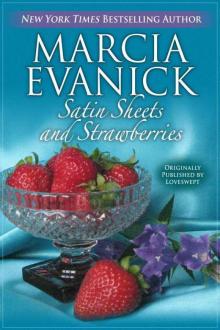 Satin Sheets and Strawberries
Satin Sheets and Strawberries My Special Angel
My Special Angel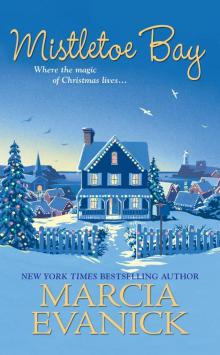 Mistletoe Bay
Mistletoe Bay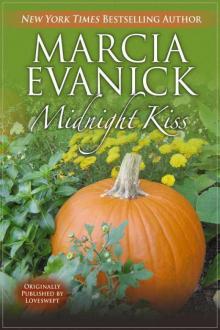 Midnight Kiss
Midnight Kiss Harbor Nights
Harbor Nights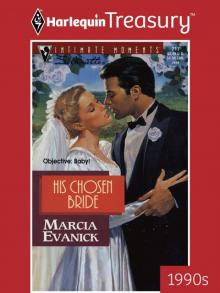 His Chosen Bride
His Chosen Bride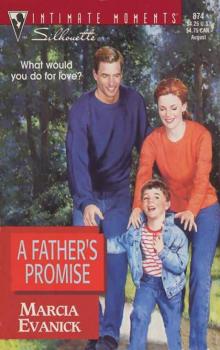 A Father's Promise
A Father's Promise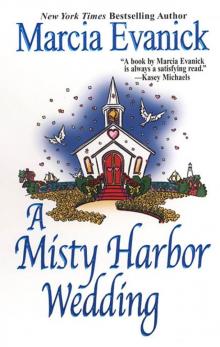 A Misty Harbor Wedding
A Misty Harbor Wedding Perfect Morning
Perfect Morning